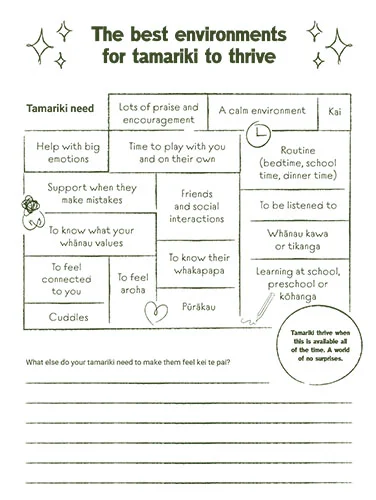
The effects of adverse childhood experiences
Research shows that exposure to adverse childhood experiences can have a lasting impact for some tamariki. It isn’t always possible to avoid adversity for tamariki, but support from important adults in their lives can lessen the impacts.
We often talk about keeping our tamariki safe by doing things like teaching them not to touch hot things and by putting baby gates on stairs. But a big part of a parent’s job is also protecting tamariki from other sources of harm, such as abuse, violence, and exposure to negative people and situations.
What are adverse childhood experiences?
Adverse childhood experiences refer to a range of negative experiences that are serious or ongoing and challenge the ability of a tamaiti to cope. Examples include the following:
- psychological, physical, or sexual abuse
- emotional and physical neglect
- violence against the mother
- living with household members with substance abuse issues, or who have mental illness, have attempted suicide, or spent time in prison
- parental separation or divorce.
These are examples that have been studied the most but are not the only types of adversity that tamariki experience.
Adverse childhood experiences can have lasting effects
How tamariki are affected by adversity will be different for each individual. However, studies suggest that exposure to adversity increases the chance of difficulties later in life.
- The more adversity tamariki experience, the more likely they are to have poor health and development outcomes.
- Negative impacts from adversity during childhood can be seen across the lifespan, decades after the experience.
- Tamariki may not show the effects of adversity straight away, but they may be affected even years later.
- Even when tamariki have been exposed to a lot of adversity, this does not mean that poor outcomes will definitely occur.
The effects of adversity can be wide ranging, and include:
- physical health issues
- mental health challenges
- difficulty learning and lower school achievement
- increased behaviour issues.
It can sometimes be overwhelming raising tamariki. They often try our patience, push the boundaries, and need a lot of our time and energy. This is because they are still learning and they need their whānau to guide them. Whānau can be reassured that things can’t be rosy all of the time, and tamariki learn from both positive and negative experiences of the world. Support from loving adults can help to lessen the impacts of adversity. But the less they’re exposed to it, the better.
Protecting tamariki from potential sources of adversity
There are lots of things that whānau can do to help protect their tamariki. Many will involve reducing risk factors – the things that make tamariki less likely to develop well and be healthy throughout their lives.
Some will be easier to implement than others. Remind whānau to reflect on the things they are doing well.
Things to consider:
- Keep tamariki away from people who drink a lot of alcohol, do drugs, or who could harm them – especially those with a history of harming others.
- See the family doctor regularly.
- Show tamariki healthy ways to deal with big emotions.
- Spend time together as a whānau.
- Create a sense of connection to the culture and traditions of the whānau, hapū , iwi , community, or faith.
- Celebrate successes and achievements of tamariki.
- Respond to stressful situations and tricky behaviour with positivity and support, instead of hitting or yelling.
- Ask for help or support if things are stressful at home or if parents are having difficulty coping.
- Remember that tamariki learn from watching the adults around them.
- Get help and support if there is violence in the home.
For tamariki, their whānau is their whole world. By showing love, kindness, and patience to them and to others, we create positive role modelling and experiences that will give them the best chance of growing into caring, healthy adults.
Key messages for whānau
The following takeaway messages will be helpful for whānau in understanding ways to lessen the effects of adverse childhood experiences.
- Tamariki need protecting from adversity as much as possible.
- Support from important adults in their lives can lessen the impacts of adversity.
- For those affected by adversity, accessing appropriate support sooner rather than later is likely to increase the chances of healthy development.
Conversation ideas

Content adapted from our partner Brainwave Trust Aotearoa. Brainwave Trust has expertise in child and adolescent development, with a focus on brain development.
Learn more
Adverse childhood experiences: Understanding their effects
Brainwave Trust Aotearoa
Exploring research findings of the association between adverse childhood experiences and poor adult outcomes.
Understanding adolescents who have experienced early adversity
Brainwave Trust Aotearoa
Understanding how adversity can disrupt childhood development and have ongoing effects into adolescence.












